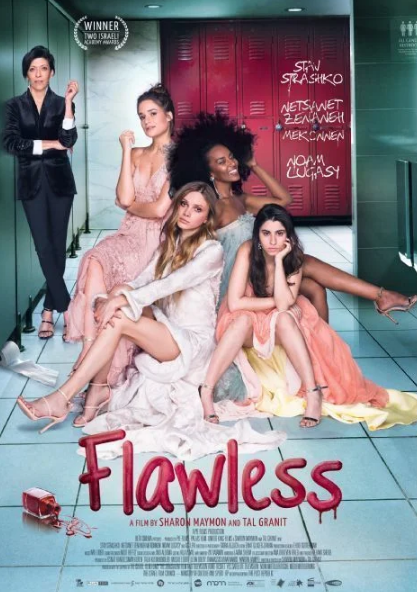‘Flawless’ Explores Danger of Keeping Secrets
AJFF presented discussion of the film as part of its In Conversation series.
The Atlanta Jewish Film Festival revisited one of the popular films from this year’s lineup, “Flawless,” as part of its In Conversation series of online programs last month. The Israeli film, which was titled “HaNeshef’” in Hebrew, or “Prom,” follows three teenage girls during the spring prom season in an upscale Jerusalem high school.
The three have all the usual social insecurities of adolescence, which are compounded by the difficulty they all have in gaining acceptance by their peers. As the host of the AJFF program July 26, Atlanta film critic Rich Eldredge put it, there are all sorts of new challenges young people face today that weren’t a part of their parent’s lives.
“I think one of the things that this film depicts so powerfully is how something can happen at school and by the time a young person gets home, it’s become viral across the internet and shared. I think that that’s one of the really important messages of this film.”
The three main characters in the film are all outsiders with their own set of secrets that have become increasingly difficult to keep. Tigist, played by the Israeli Ethiopian actress Netsanet Mekonen and Keshet played by Noam Lugasy are best friends. What they don’t know is that a newcomer to their high school, Eden, is a transgender female. Eden’s secret gives the work a certain weight that films of this genre often don’t have.
The team of Sharon Maymon and Tal Granit, who both wrote the bright and sharply observed script and very capably directed the film, searched for a year to cast the role of Eden.
Their pick was the noted Israeli transgender model, Stav Strashko, who had immigrated as a child from the Ukraine. She was said to have had a troubled transgender childhood and left home when she was 14.
During the AJFF program Strashko characterized life in Israel for young people like herself as difficult, particularly for those who publicly identify themselves with the transgender community.
“About 90 percent of transgender people are still getting rejected from their families. And there’s still, you know, later on, there’s still a lot of discrimination we’re still struggling with. We’re still in a place where we’re fighting for equal rights.”

Strashko’s sensitive portrayal of the problems Eden encounters as she attempts to fit in with her newfound friends and the other students at the high school are at the heart of the film’s success. Last year she became the first transgender person ever nominated for Best Actress at Israel’s Ophir Awards, the country’s top film honor.
“Flawless” was nominated for a total of 12 Ophirs, including best picture and best director. The film had its U.S. premier last year at the prestigious Tribeca Film Festival in New York. The Jewish Federation of Greater Atlanta sponsored the screening at this year’s AJFF. It is currently available as a video on demand choice at Vimeo.com.
In the film, Eden changes schools frequently and she and her family have had to move when her gender identity is discovered. Secrecy becomes for her a way of life.
Living in that way is considered not a healthy psychological choice, according to Rebecca Stapel-Wax, who has counseled young people as a therapist. Stapel-Wax is also the executive director of SOJOURN, the Atlanta organization that works with Jewish gay, lesbian and transgender youth.
“How important are secrets? I think they are survival skills in many ways. And it’s so incredibly dangerous. I know that teens will often feel like they need to be so loyal to one another that they would keep a secret no matter what. I work on suicide prevention programs and we often are telling young people how, when you are sharing with a trusted adult about somebody who may be in crisis, you’re not getting them in trouble. You’re getting them out of trouble.”
Strashko, who has become an important voice for the acceptance of transsexuals as result of the film, feels that parents have an important role to play in supporting the choices that young people make about their gender. She sees the film as making that difficult job, somewhat easier.
“Unfortunately, the situation in the world is that most parents don’t get to the point where they can accept this. But I really hope that people would understand that it’s not something that we choose and it’s something that is just the way we are. If your kid is a trans person, you have to support them because at the end of the day if you don’t, it just causes major pain.”





comments